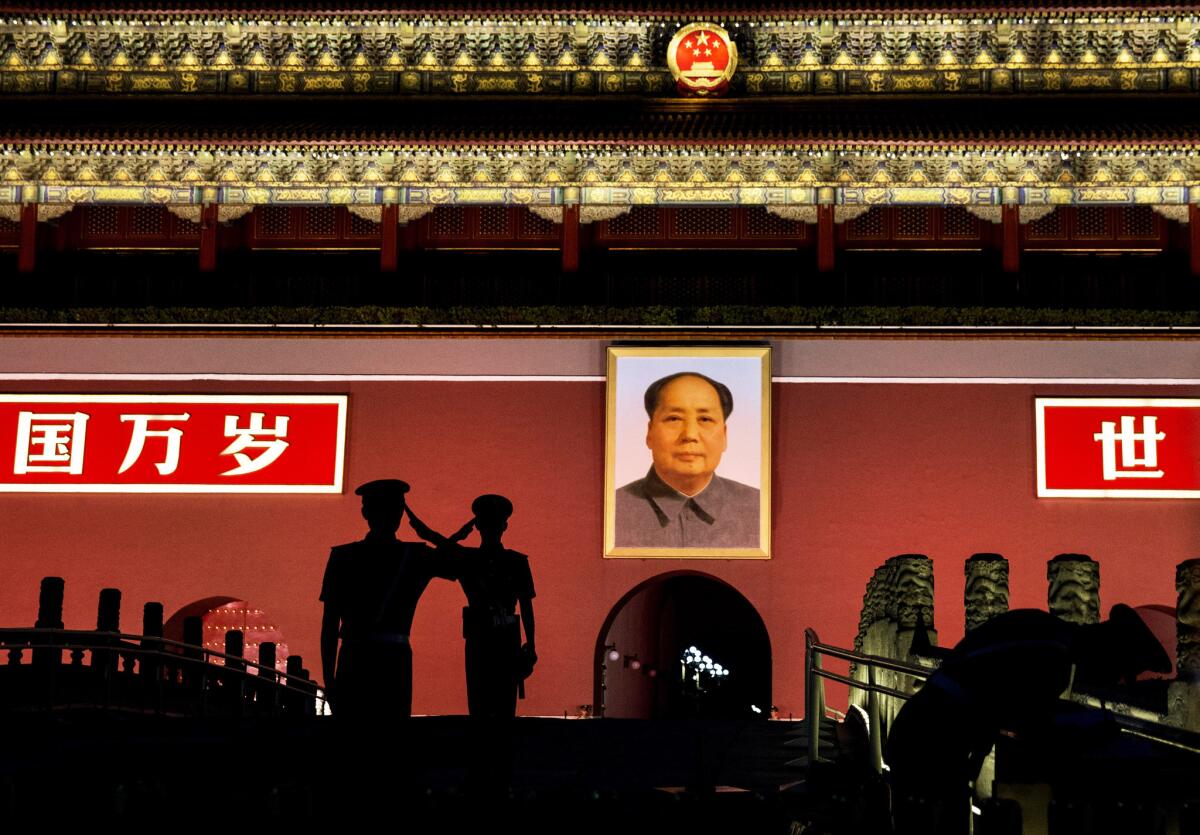Few visitors, heavy security as China marks Tiananmen Square anniversary

Stress kindness, value people, defend sincerity, worship justice, value harmony and seek an ideal world.
As the 25th anniversary of China’s bloody crackdown on pro-democracy protesters passed quietly, if tensely, Wednesday, two large video screens in the center of Tiananmen Square silently flashed a series of Communist Party slogans. No one here was supposed to acknowledge anything was out of the ordinary, but reminders of the extraordinary events of June 4, 1989, were in plain sight.
Troops in fatigues and helmets rode in white open-air jeeps, slowly lapping the plaza. Inside parked air-conditioned buses, scores of uniformed police cooled off until their next shift at security checkpoints. At the northeast corner of the square, a 36-year-old man with a scruffy mustache and a purple shopping bag struck up a quiet conversation with a Los Angeles Times journalist.
“You’re a reporter, right? They didn’t let you in, did they?” he said, almost under his breath.
Asked why he had come to Tiananmen on this day, he launched into a tale about his impoverished parents and other struggles of his family, despite the nation’s economic boom in the last quarter-century.
“Simple. I’m here because Xi Jinping doesn’t want anyone here today,” he concluded, glancing around a bit cagily after mentioning the Chinese president.
But how many others shared his sentiments -- or even his awareness of the anniversary -- was unclear. The state-run media do not mention it; China’s armies of Internet censors prevent any discussion of it; even some messages including the number “25” were blocked from social networking sites such as Weibo on Wednesday.
One Tiananmen visitor, a 24-year-old communications student, when asked if he knew what happened on the site 25 years earlier, replied with apparent sincerity, “No, what? I really don’t know.”
Another student of about the same age said he was “too young to remember” anything from that time, although he gave the impression he knew what had transpired.
Tourists seemed to understand that they were supposed to avoid the area. By late afternoon, the square had only a few hundred tourists and a far larger security presence. Armed police in khaki marched in formation. Plainclothes officers in pink polo shirts rode folding bicycles, and uniformed police in blue cruised on Segways. Undercover cops sported T-shirts tight enough to show off their biceps.
In the square, the party line kept flashing as small tour groups strode past the Monument to the People’s Heroes, an obelisk at the center of the plaza, just south of the video screens.
To realize the Chinese dream of the great revival of the Chinese nation means realizing national prosperity and power, national rejuvenation, and people’s happiness.
At the southeast corner of the square, a queue of several hundred people wilted in the sun, inching forward toward a security checkpoint. A man hawking rainbow umbrella hats tried to make a sale to the sweaty crowds. An infant, naked except for a T-shirt, wailed as his grandmother tried to entertain him. A young man in line, spotting a Westerner, asked: “Are you a journalist? Don’t waste your time.”
The line crept along for more than an hour. Police scrutinized each visitor’s national ID, checking each card with an electronic, hand-held scanner. Old women were body-wanded with metal detectors. Backpacks were X-rayed.
A Times reporter and two visiting friends from the U.S. were turned away after officers examined their passports, using a walkie-talkie to radio a supervisor with their visa numbers.
“You know why,” said one officer. “Come back tomorrow.”
In another line, many Chinese tourists appeared clueless about the decidedly paranoid atmosphere.
“Don’t you think it is a bit strange today? The way people are staring at each other,” a young woman in a sundress asked her male companion as they waited in the security line.
“I heard something happened here,” the man replied. She said nothing in response, and the couple lapsed into silence.
One Times journalist was allowed into the square and found so many police interspersed among the tourists that it felt like a throwback to the old days, when Chinese were afraid to speak to foreigners.
Within seconds after striking up a conversation with a Chinese tourist from the northeastern Heilongjiang province, both were swarmed by 20 security personnel who demanded to know the subject of the conversation and confiscated the reporter’s passport and the tourist’s ID card.
After telephoning superiors for instructions, they returned the papers and escorted the journalist out of the square.
“You’ve been here long enough,” a policeman in a black T-shirt said when asked for an explanation.
Police vans and cars rolled up the east side of the square, along with taxis and buses. Under a green umbrella, three soldiers held automatic weapons. Behind them, on the facade of the Forbidden City, Mao Tse-tung’s portrait looked out over the lightly populated plaza, facing the video screens.
Wealth and power, democracy, civilization, harmony, freedom, equality, justice, rule of law, patriotism, diligence, honesty, kindness.
Ahead of the anniversary, scores of artists, intellectuals, lawyers and academics were detained, in an apparent bid to silence anyone who might dare to publicly mark the anniversary.
At the University of Political Science -- from which many student protesters hailed 25 years ago -- administrators organized out-of-area “study tours” for foreign students. Some believed that the mandatory field trips were designed to ensure they stayed away from Tiananmen.
Some activists had called on people to wear black to the square as a quiet commemoration, but few people in such attire were evident at midday.
And no one dared to display anything like the banners that students in the square had held aloft 25 years ago, with slogans including “All power belongs to the people!” Instead, some visitors took selfies in front of the propaganda screens, capturing the political messaging of the day.
Implement more deeply the strategy of a humane Beijing, a scientific and technological Beijing, and a green Beijing. Make great efforts to build Beijing into a first-class harmonious and livable capital.
Nicole Liu in the Times’ Beijing bureau contributed to this report.
More to Read
Start your day right
Sign up for Essential California for news, features and recommendations from the L.A. Times and beyond in your inbox six days a week.
You may occasionally receive promotional content from the Los Angeles Times.







